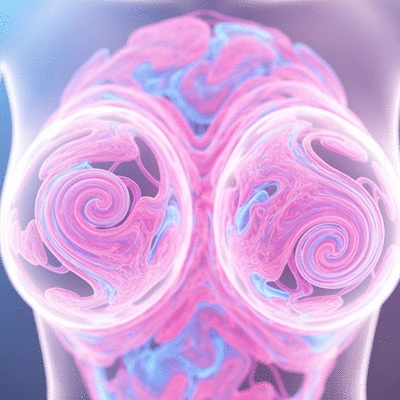Understanding Breast Tenderness Causes

Breast tenderness is a common experience for many women, often linked to hormonal fluctuations throughout various life stages. Understanding these changes can empower you to manage discomfort more effectively. Let's delve into key insights that can help you navigate this topic with confidence.
What You Will Learn
- Breast tenderness, or mastalgia, frequently occurs due to hormonal changes, particularly during the menstrual cycle.
- Tracking your menstrual cycle can help identify patterns in breast tenderness, allowing for better management of symptoms.
- Hormones such as estrogen and progesterone play crucial roles in breast tissue changes, especially in relation to menstrual cycles and pregnancy.
- Understanding the phases of the menstrual cycle can aid in anticipating breast tenderness and taking proactive steps for relief.
- PMS can exacerbate breast tenderness, making it important to maintain a healthy lifestyle to mitigate symptoms.
- Hormonal shifts during pregnancy can lead to increased sensitivity and discomfort, necessitating supportive measures for relief.
- Perimenopause and menopause bring about hormonal fluctuations that can once again lead to breast tenderness, requiring awareness and proactive management strategies.
Life Stages & Breast Tenderness: Hormonal Influences
This visual illustrates how various life stages and associated hormonal changes can impact breast tenderness, highlighting key hormones and their roles.
Menstrual Cycle
Fluctuations in estrogen and progesterone lead to tenderness, especially in the luteal phase.
PMS Connection
Hormonal surges and fluid retention contribute to heightened sensitivity.
Puberty Onset
Increased estrogen drives breast development, often causing tenderness.
Pregnancy & Postpartum
Significant hormonal shifts, especially prolactin, prepare for lactation.
Perimenopause & Menopause
Fluctuating estrogen levels can lead to discomfort or estrogen dominance.
Understanding How Hormonal Changes Influence Breast Tenderness
Have you ever found yourself puzzled by an unexpected wave of breast tenderness? You're certainly not alone! Many women experience this discomfort, often linked to shifting hormonal levels. In this section, I'll help you understand what breast tenderness is and why it happens, so you can gain more insight into your body.
What Is Breast Tenderness and Why Does It Occur?
Breast tenderness, also known as mastalgia, is characterized by pain or discomfort in the breast area. It can feel like a sharp pain, a dull ache, or a sensation of heaviness. This condition can occur due to various reasons, but it is most commonly related to hormonal changes. Recognizing the patterns of breast tenderness can empower you to manage it better.
- Hormonal fluctuations during the menstrual cycle
- Pregnancy-related changes
- Effects of medication or lifestyle factors

Understanding the underlying causes of breast tenderness allows you to pinpoint when it might happen and take proactive steps. Have you tracked your symptoms in a diary? This can be a great way to connect the dots and identify what's affecting your comfort!
The Role of Hormones in Breast Tenderness
Hormones play a significant role in breast tenderness. When estrogen and progesterone levels fluctuate, particularly during your menstrual cycle, it can lead to increased breast sensitivity. This sensitivity occurs as the breast tissue prepares for a potential pregnancy, causing the ducts and glands to swell. Understanding the hormonal mechanisms behind breast tenderness can help clarify why these sensations occur periodically.
- Estrogen: Often the key player in breast tissue changes.
- Progesterone: Works alongside estrogen to prepare the breasts for possible lactation.
- Prolactin: This hormone becomes vital during pregnancy and breastfeeding.
By familiarizing yourself with these hormonal influences, you can better understand your body's responses. Feeling empowered yet? Remember, being informed is the first step towards effective management of your breast health!
Exploring the Hormonal Fluctuations Throughout Different Life Stages
As women, our bodies undergo various hormonal changes throughout life, and understanding these stages can significantly impact how we manage breast tenderness. From puberty to menopause, let's explore how each stage affects our breast health.
Breast Tenderness During the Menstrual Cycle
During your menstrual cycle, the balance of hormones shifts dramatically. As estrogen peaks and then drops, many women experience breast tenderness in the days leading up to their period. Recognizing the timing of these fluctuations can help you prepare for potential discomfort.
The Impact of Estrogen and Progesterone Levels
Estrogen rises in the first half of your cycle, promoting breast tissue growth. After ovulation, progesterone levels increase, which can lead to swelling and sensitivity. Understanding this natural cycle and how hormones like estrogen and progesterone directly influence breast tissue can help you anticipate when tenderness might occur.
- Track your menstrual cycle for patterns in breast tenderness.
- Note the intensity of discomfort and any other symptoms.
- Consider lifestyle changes to ease discomfort during this phase.
By monitoring your symptoms, you can tailor your approach to managing tenderness effectively. Have you found any strategies that work for you during this time?
Understanding PMS and Its Connection to Breast Sensitivity
Premenstrual Syndrome (PMS) can contribute to heightened breast tenderness. In fact, many women find that PMS symptoms, including breast pain, can disrupt daily life! Understanding this connection helps you recognize that you’re not alone in your experiences.
- PMS symptoms can include mood swings, bloating, and breast discomfort.
- A healthy lifestyle can mitigate some of these symptoms.
- Keep an eye on your diet and stress levels during this time.
Managing PMS effectively can alleviate some breast tenderness, leading to a more comfortable experience each month. Have you experimented with any specific dietary changes to help with PMS?
Puberty: Initial Hormonal Changes and Their Effects
During puberty, the body undergoes significant hormonal changes as it develops. For many young women, this can mean the first experience of breast tenderness. It’s a natural part of growing up, even if it can be a bit uncomfortable!
Understanding that this is a normal phase can help ease any anxiety surrounding the changes happening in your body. Remember, these experiences will become part of a broader understanding of your unique health journey.
Pregnancy and Postpartum: Changes That Affect Breast Sensitivity
Pregnancy brings a whirlwind of hormonal shifts, resulting in increased breast tenderness as the body prepares for breastfeeding. The surge of hormones like prolactin helps in developing the mammary glands, leading to sensitivity and swelling.
The Role of Prolactin and Lactation in Breast Health
Prolactin is a crucial hormone during pregnancy and lactation. It enables milk production, influencing breast tissue. However, the changes can also lead to discomfort. Having a supportive network can help you navigate these changes with confidence.
- Consider wearing a supportive bra as your body changes.
- Stay hydrated and maintain a balanced diet.
- Don’t hesitate to reach out for support from healthcare professionals.

Embracing this time with knowledge and support can empower you to manage discomfort effectively.
Perimenopause and Menopause: Transitioning Hormones and Breast Pain
As women transition into perimenopause and menopause, hormonal fluctuations can lead to breast tenderness once again. It’s a time of change, and understanding what’s happening in your body can help you feel more in control.
Identifying the Symptoms of Estrogen Dominance During Menopause
During menopause, some women may experience estrogen dominance, where estrogen levels remain high relative to progesterone. This imbalance can lead to breast pain and other symptoms. Recognizing these patterns is key to taking appropriate action.
- Track changes in your body and symptoms.
- Discuss your experiences with healthcare professionals.
- Explore lifestyle changes to help balance hormone levels.
Being proactive about your health during this time can help mitigate discomfort. What strategies have you found helpful in managing these changes?
Pro Tip
Have you considered keeping a symptom diary? Tracking your breast tenderness alongside your menstrual cycle can reveal patterns that empower you to manage discomfort proactively. Noting the intensity of your symptoms and any accompanying lifestyle factors can provide valuable insights for you and your healthcare provider.
Frequently Asked Questions About Breast Tenderness
- What is breast tenderness?
- Breast tenderness, or mastalgia, is pain or discomfort in the breast area, often described as a sharp pain, dull ache, or heaviness. It's frequently linked to hormonal changes.
- What role do hormones play in breast tenderness?
- Hormones like estrogen, progesterone, and prolactin significantly influence breast tenderness. Fluctuations in these hormones, especially during the menstrual cycle, pregnancy, and menopause, can cause breast tissue to swell and become sensitive.
- How does the menstrual cycle affect breast tenderness?
- During the menstrual cycle, rising estrogen levels in the first half and increased progesterone after ovulation can lead to breast tissue growth, swelling, and sensitivity. Tenderness often subsides as hormone levels drop before menstruation.
- Can PMS cause breast tenderness?
- Yes, Premenstrual Syndrome (PMS) often includes breast tenderness due to hormonal surges and fluid retention. Managing PMS through lifestyle changes can help alleviate this discomfort.
- Why do pregnant and postpartum women experience breast tenderness?
- Significant hormonal shifts during pregnancy, particularly increased prolactin, prepare the body for lactation, leading to heightened breast sensitivity. Postpartum, breast tissue also adapts to milk production, which can cause tenderness.
- Is breast tenderness common during perimenopause and menopause?
- Yes, hormonal fluctuations during perimenopause and menopause, including fluctuating estrogen levels or estrogen dominance, can lead to breast pain and discomfort.
- What is estrogen dominance?
- Estrogen dominance occurs when estrogen levels are high relative to progesterone, leading to symptoms like breast tenderness, bloating, and mood changes, particularly during menopause.
- What are some strategies to manage breast tenderness?
- Strategies include tracking your menstrual cycle, wearing a supportive bra (especially during pregnancy), maintaining a balanced diet, staying hydrated, managing stress, and discussing symptoms with healthcare professionals.
Exploring the Hormonal Fluctuations Throughout Different Life Stages
As women journey through different life stages, hormonal changes can significantly affect breast tenderness. Understanding these fluctuations is crucial for recognizing why you might experience breast sensitivity at various times in your life. From the onset of puberty to the transitions of menopause, each stage brings its own hormonal challenges that can impact your breast health.
In this section, we’ll explore how hormonal shifts influence breast tenderness during key periods such as your menstrual cycle, pregnancy, and beyond. Knowing what to expect can help you take the necessary steps for relief and support your breast health.
Breast Tenderness During the Menstrual Cycle
Many women notice breast tenderness as a common symptom of their menstrual cycle. This discomfort primarily stems from hormonal fluctuations, specifically the rise and fall of estrogen and progesterone. As these hormone levels change, you might experience varying degrees of sensitivity.
- Follicular Phase: During the first half of your cycle, estrogen levels rise, often leading to increased breast tenderness.
- Luteal Phase: After ovulation, progesterone levels peak. This can also contribute to breast sensitivity and swelling.
- Menstrual Phase: As hormone levels drop before menstruation, breast tenderness usually subsides.
By tracking your cycle, you can gain insights into your body’s patterns! Have you ever considered maintaining a diary to observe when these changes occur? It might help you anticipate and manage your discomfort better.
The Impact of Estrogen and Progesterone Levels
Estrogen and progesterone play pivotal roles in breast health and tenderness during your menstrual cycle. When estrogen levels surge, the breast tissue can become more sensitive, leading to that familiar discomfort. Conversely, progesterone prepares your body for a possible pregnancy, which can also cause tenderness.
It’s essential to remember that every woman’s experience is unique. Some may find their symptoms are mild, while others may experience significant discomfort. Recognizing the fluctuations can empower you to take control of your health and respond proactively!
Understanding PMS and Its Connection to Breast Sensitivity
Premenstrual Syndrome (PMS) encompasses various symptoms, including mood swings, bloating, and breast tenderness. The link between PMS and breast sensitivity primarily revolves around hormonal changes that occur leading up to your period.
- Increased sensitivity due to hormonal surges.
- Fluid retention that can exacerbate tenderness.
- Emotional factors contributing to perceived discomfort.
If you experience PMS regularly, consider implementing some lifestyle changes to ease your symptoms! Simple adjustments in diet, exercise, and stress management can make a world of difference.
Puberty: Initial Hormonal Changes and Their Effects
Puberty is a time of significant hormonal change, which can lead to breast tenderness. As your body produces more estrogen, breast tissue begins to develop, often resulting in discomfort. This sensitivity is a natural part of growth and varies widely among individuals.
If you’re a parent or guardian of a young woman experiencing these changes, it’s important to provide support and understanding. Open conversations about these bodily changes can help alleviate anxiety and foster a sense of normalcy.
Pregnancy and Postpartum: Changes That Affect Breast Sensitivity
During pregnancy, the body undergoes drastic hormonal changes, particularly with rises in prolactin and other hormones that prepare the body for breastfeeding. This can lead to heightened breast sensitivity and tenderness.
- First Trimester: Increased blood flow and hormonal surges can cause significant tenderness.
- Second Trimester: As your body adjusts, tenderness may decrease but can still be present.
- Postpartum: Breast tissue may experience tenderness as it adapts to lactation needs.
Understanding these changes can help you anticipate your body’s needs during this transformative time. Have you explored ways to support your breast health during pregnancy? Strategies like wearing a supportive bra can provide comfort as your body changes!
The Role of Prolactin and Lactation in Breast Health
Prolactin plays a crucial role during lactation, impacting breast sensitivity as your body produces milk. While this hormone is essential for breastfeeding, it can also contribute to discomfort during this period.
Being aware of these changes can help you prepare and seek support when necessary. Remember, it’s okay to reach out to healthcare professionals if you have concerns about breast tenderness during pregnancy or breastfeeding!
Perimenopause and Menopause: Transitioning Hormones and Breast Pain
As women approach menopause, hormonal shifts can lead to a range of symptoms, including breast tenderness. During this transitional phase, estrogen levels can fluctuate dramatically, causing discomfort.
- Perimenopause: Hormonal imbalances may lead to cyclical breast pain.
- Menopause: Decreasing estrogen levels can also cause tissue changes, potentially leading to sensitivity.
Understanding these changes can help you prepare for this stage of life. Have you discussed your symptoms with a healthcare professional? They can offer personalized advice tailored to your experiences.
Identifying the Symptoms of Estrogen Dominance During Menopause
Estrogen dominance occurs when the balance of estrogen and progesterone is disrupted. Symptoms may include breast tenderness, bloating, and mood changes. Recognizing these signs is crucial for managing your health effectively!
During this time, it’s important to advocate for yourself. You deserve to feel comfortable and informed about your health decisions. Seek guidance from professionals who can support you in navigating these changes.
Recap of Key Points
- Breast tenderness, or mastalgia, is often linked to hormonal changes, particularly during the menstrual cycle, pregnancy, and menopause.
- Tracking menstrual cycles can help identify patterns in breast tenderness related to hormonal fluctuations.
- PMS can exacerbate breast sensitivity, making it important to manage lifestyle factors such as diet and stress.
- During pregnancy, increased hormones like prolactin lead to heightened breast tenderness as the body prepares for breastfeeding.
- Understanding hormonal changes during perimenopause and menopause can help women manage breast discomfort effectively.








